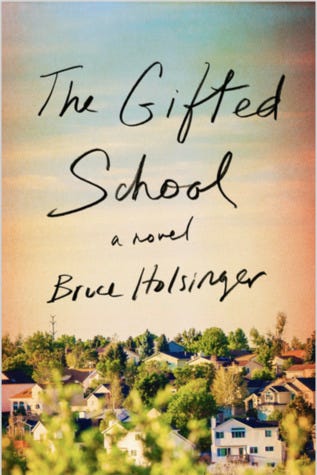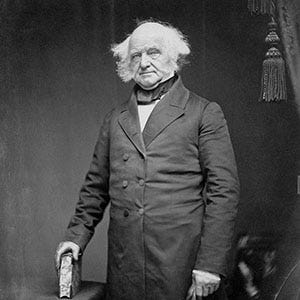What I'm Reading (No. 97): Gifted School + POTUS #8
Just yesterday I finished reading about Martin Van Buren — our eighth president. He was rather interesting, but hasn’t gotten the attention of a prominent historian or writer in far too long.
And a little over a week ago, I finished a page-turning new novel about the lengths parents will go to in order to get their kids into a “gifted” school.
Enough preamble. Let’s do it.
The Gifted School by Bruce Holsinger (2019, 450 pages)

“You’ll be a lot less obsessed with what people think of you when you understand how infrequently they do.”
What a delightfully entertaining and compulsively readable novel. It first caught my attention because it’s set in Colorado in the fictional town of Crystal, which is modeled after Boulder. (If you know Boulder, you’ll recognize a lot of the culture and even places.)
A group of four very tight families are eager — nearly rabid, in fact — to get their children (of varied ages, but mostly middle schoolers) into a new public school that’s opening just for the “gifted.” There are tests, interviews, resumes, and projects . . . and it quickly becomes clear that the parents will do just about anything to show, whether in reality or as an illusion, that their kids are gifted.
Competition between these families and kids predictably ensues, some of the characters barrel towards self-destruction, and the true natures and insecurities of the parents are revealed to all.
As a parent of young children, it was rather amusing to read about the sometimes-crazy and yet also sometimes-normal/relatable parents. Our kids have only been in daycare and pre-K so far, but you can already see that some parents are just more gung-ho than others about their involvement and control over their offspring’s education. Even when seemingly acting by way of insanity, most of the time these parents are just trying to provide good outcomes for their kids.
And that’s the balance that Holsinger strikes so well. It’d be easy to write this type of story in a way that portrayed every character as deplorable and one-dimensional, but that’s just not the case. As a reader, I found myself somewhat surprisingly cheering for these people — not necessarily that they’d get what they want, but that their eyes would be opened and that their relationships would be more honest and healthy. I wasn’t hoping for total destruction (as is the case with plenty of characters in plenty of the novels I read).
I won’t give the away the ending, as there are a few wonderfully juicy turns of plot, but I was rather satisfied with where all the characters ended up. The Gifted School is certainly a bit of a drama-heavy guilty pleasure, but it’s also partly a cautionary tale about wanting the best for your kids and that best even means.
I enjoyed it immensely, as did my wife. If you have kids who are neck-deep in this world of education and admissions and “giftedness,” it might hit too close to home.
It’s a long book but one that read very quickly, and I think it will stand out when I look back at my 2019 reading.
An Educational Reading List
A list of books set at schools. They’re mostly college settings, but not all, and each captures something unique and essential about the experience of being a student.
A Separate Peace by John Knowles. Classic story of two boys at a boarding school during WWII.
The Secret History by Donna Tartt. Great read about a group of elitist friends at a New England college. Reminiscent of How to Get Away With Murder.
Harry Potter by JK Rowling. Of course.
Loner by Teddy Wayne. Short and powerful little novel about a young man who loses his sense of self (and morality) when he falls in love at college.
Friday Night Lights by Buzz Bissinger. Yes, it’s about football, but also the school and the community around that football team.
The Unlikely Disciple by Kevin Roose. Really interesting book about the author’s undercover semester at the evangelical and conservative Liberty University.
The Art of Fielding by Chad Harbach. Baseball star at a small college gets the yips. Lives are changed.
Columbine by Dave Cullen. Sad and powerful and essential reading to understanding how that fateful day changed our nation (and the metro area I now call home).
Martin Van Buren and the American Political System by Donald Cole (1984, 432 pages)

“Instead of offering something new, he sought to keep the political peace. Instead of trying to rally the troops and destroy the enemy, he sought to satisfy his followers and placate the opposition.”
With Martin Van Buren, I embarked on what is sure to be the saddest and more boring stretch of presidents in my project of reading a biography of every POTUS. Between Jackson (#7) and Lincoln (#16) lies a long stretch of very unexciting fellows: Tyler, Taylor, Fillmore, Pierce — don’t feel bad if none of those ring a bell.
These were largely the second generation of Americans (the first generation being British subjects, but those who fought for and founded the nation). In fact, Van Buren was the first president to be born after the Declaration of Independence. And for the most part, these guys between #7 and #16 were crummy national leaders.
That said, Van Buren was surprisingly interesting to read about. A few notables:
Only president who grew up with English as a second language (Dutch was his first).
First president to be a real career politician and not just a national hero who’d been elevated to national leader. Worked his way through New York politics and into national politics, ultimately becoming Andrew Jackson’s friend, advisor, confidante, and Vice President.
Largely credited with the creation of the party system that’s now so familiar in our political landscape. He thought parties were healthy for the nation. Agree or not, you can thank MVB for that one.
Was president from 1837-1841. Lost the 1840 election to William Henry Harrison, who died just a month after taking office. MVB unsuccessfully (and sort of unofficially) tried again for the presidency in both 1844 and 1848.
While being Andrew Jackson’s #2 launched him into the White House, it also meant the guy could never escape from under Old Hickory’s long shadow. Combine that with Van Buren’s tendency towards appeasement rather than holding a strong moral ground on anything, and you get a guy who ultimately faded into the history books as a foppish, failed leader.
Given how interesting the life of Martin Van Buren was, I’m rather surprised that there aren’t more books about the man. There’s really only a few options, all of which are a bit dry and academic and stale. Donald Cole was a fine author and peppered in plenty of engaging context and analysis, but nobody would mistake him for being a master of prose or narrative. Between the few page-turning episodes were chapters and chapters on banking battles, political party in-fighting, and other topics that get real boring real quickly.
MVB hasn’t been seriously written about in a few decades, which makes him a subject ripe for the picking . . . if it hasn’t happened in another 20 years maybe I’ll take it on!
That’s all for me this week. Happy Thanksgiving everyone! I’m sure thankful for your time and inbox space; it really means a lot to me.
-Jeremy
